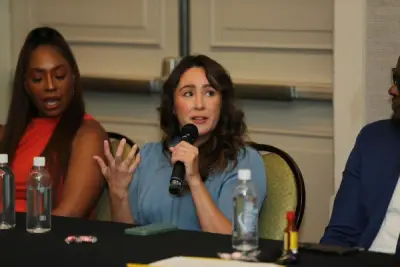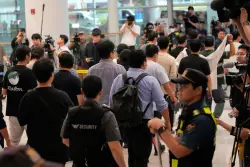In conversation with Denise Santos of Latinas in Media Atlanta

Denise Santos, co-founder of Latinas in Media Atlanta (Photo courtesy of Denise Santos). A month from now, a short film block curated by the organization Latinas in Media Atlanta will screen at the Peaberry Film Festival in Canton. According to Denise Santos, this is the first time in the organization’s eight-year history that it has curated a block at a film festival, which will run from 1-3 p.m. on Oct. 4. Santos is one of the co-founders of Latinas in Media Atlanta, which has grown from a simple Facebook group in 2017 to an organization that works to empower Latine creatives within Georgia’s film industry. Santos is an actress and producer, and has appeared in everything from television shows like “The Resident” to stage plays like “The Vagina Monologues.” Rough Draft Atlanta spoke with Santos about the formation of Latinas in Media Atlanta and how she thinks the film industry in Georgia can better serve the community moving forward. How did you end up getting involved in the film industry? Did you always know that was something you wanted to do? Denise Santos: My mom was actually a beauty queen in Ecuador [laughs], so she immediately put me in modeling schools. I don’t know if you remember, like John Casablancas, or Barbizon [Modeling and Acting School] – I was in those silly classes. I think my mom’s hope was that I would learn there, but then I would be a doctor or something. I was like, yeah – that’s not gonna happen, mom! I like this pretending stuff. This is kind of cool. So it stems back from when I was a little, little girl. I did background work. I started off doing independent projects and not really fully understanding the community in South Florida – that’s where I’m originally from, born and raised in Miami. I moved here almost 17 years ago. So 17 years ago, I was already kind of doing it as much as I could, still with a day job, and realized that I really missed my community of people I would bump into in Miami. Miami is so intertwined culturally, especially with Latinos, and underrepresented voices. It’s just kind of part of the everyday. I realized that I didn’t see that here, and I missed it. That’s kind of where Latinas in Media [Atlanta] started. I would bump into the same actresses and the same friends in the audition rooms. At one point, there was this one actress – her name is Viviana Chavez – and I was like, “I totally am stalking you. Please forgive me, but I want to be you when I grow up.” We started talking, and we both realized that we wanted to start a community. That’s where also Gabriella Ortiz, who unfortunately doesn’t live here anymore, started on that too. In 2017, I started a Facebook group. I was kind of doing it by myself, just doing lunches. And then in 2018, we started doing showcases and readings, and being more interactive within the film community. 17 years ago, Atlanta was still on the up and up as far as its film industry. Why not New York or L.A.? Santos:I like to say that I moved here before all the fun craziness happened. I’m very proud of that, but I didn’t move here for that. My husband was actually transferred here for work. The plan was if it didn’t work out here, that we would just move back to South Florida. Everything very quickly started picking up right before that wave hit. That’s when I started doing everything. I have three children, so my kids were born here. At that point, we were rooted in, and we were like, okay – we’re not going back. This is our home now. This is where we are, and I’ve been loving it ever since. Serendipitous for you, that everything started popping off. Santos: That’s the whole thing – I didn’t know. At that point, I was focused on being a mom. I have these conversations a lot of times with friends of mine who are parents. We have seasons where we plan on doing things a certain way, and then our personal lives kind of take a detour. That’s where my season was at that time – my focus was on my family and my children. I think the rest of the world and my friends were like no, no, no – you gotta come back. Let’s do something else. Let’s keep doing fun stuff. I’m like, okay! [Laughs] When you started Latinas in Media Atlanta and started having those initial meetings, what came out of those? Did you find that people were feeling the same way you were, as far as the smallness of the community? What other issues arose out of those first initial meetings? Santos: Yes – all of that, everything you said. Because everyone that I met here came from somewhere, whether being first generation like me, or from another city or from another country. Everyone that I bumped into that was from a similar background and culture as me kind of missed having that community and that family. A lot of people were here alone, without family, and so I think that really turned into something more than just having lunches together. People really bonded and really started to collaborate on a deeper level than just exchanging resources and working together. It was something really special, and that really encouraged and inspired me to want to keep doing more with Latinas in Media Atlanta, and see what else we can accomplish, so that it’s not only community building, but also helping us thrive. How do you think the Latino community in the film industry has grown since that time? Santos: I mean, you know, we still have a ways to go. I think that there are people who are consistently trying to create opportunities for the community. Nationally, it’s getting better. We’re still not where we want to be, where it should be, where it represents the global majority. But within Georgia, we’ve definitely seen significant growth. And people that move here from our Latino cultures, seeing that there is a community, people that are moving here are actually embracing it, and feeling seen and feeling heard. There are so many other organizations that really amplify the creative. I like to say that we’re by creatives, for creatives. We’re all producers, we’re all actors, we’re all writers. We’re all working behind the scenes, running camera, running lights. We’re wanting to create the same opportunities that we feel we wish we had. You’ve got the happy hours, you’ve got Cafe Con Lima, and all kinds of stuff now. How, in your eyes, has Latinas in Media grown, and what resources does it offer to support the community? Santos: Every year, we try to challenge ourselves more and more, depending on what we feel we would like to see. So this year, we’re very lucky, and we’re collaborating with Peaberry Film Festival. [Festival Director] Brent Lambert-Zaffino, he reached out to me right before Viviana Chavez stepped away to grow her family – she came back – but he sent me an email right before. Funny enough, I worked with him 10 years ago on a short film when he was still in college. He reached out like, hey, I really love what you’re doing. I would love to give you an opportunity and just give you guys a block. Do a Latina film block. What do you think? I was like, gosh, I’m kind of doing this by myself right now! I don’t know if I can. It’s that fear of, this is what I’ve been wanting to do, I should just do it. When Viviana Chavez jumped back in after her break, I just knew it was something we had to keep pushing to do. Now, our next endeavor is the film festival with Peaberry, where we’re going to be able to have that Latine block. It’s more than just a film festival screening. It’s going to be an immersive cultural experience where people from the communities can really come in and enjoy themselves, and see themselves represented on screen. It’s not just for people within our culture and our communities, but outside of that as well. We really want people to visit and to take part in learning something a little bit outside of what we all see every day. Cafe Con Lima is a monthly mixer. We keep those very intimate in a coffee shop, and we have been able to collaborate with El Ponce, a restaurant in Midtown. Rosa Thurnher is another person and an ally who has opened up her restaurant and said – whatever dates you need, you just let me know and the restaurant is yours. It’s been amazing collaborating with her. I don’t know that our Cafe Con Limas would be consistently possible without her. We have lots of other things in the works too. We are working on some grants. We’re working on amplifying the festival and growing it a little bit more. We’re working on collaborations with other communities outside of Latinas in Media Atlanta, so that we can provide even more resources, not only to the Latino community, but Asian community, Black community, disabled community. We want to really make sure that we’re working with any underrepresented group outside of Latinos in Atlanta. The grants aspect is interesting to me. Is that something you’ve been wanting to do for a while? Obviously Georgia has a crew-based industry, but as far as independent and homegrown film, we’re still a little behind. Is that something you’ve always wanted to do? Santos: Absolutely. In conversation with filmmakers, that’s really such a big chunk of what we need. I feel it’s a bridge that we’re missing to really walk through here. Especially with the independent community, with the film industry in general, having all of the big Marvel [movies] and the big productions in town, I feel at one point, the independent film community felt like it was out of reach. The thing about the independent film community that is so amazing is that we don’t let that stop us. I call Latinos in Media Atlanta a big part of the independent film community, because we also are marginalized because of budgeting, because of finances, because of resources. The independent film community in Atlanta … they don’t let money stop them. We grab a phone. We have friendships with people that work in different departments, and we’re like, hey, let’s create. Let’s put something together. What can we do to help? Let’s make this film. Let’s make it happen. I love that about Atlanta. Atlanta just makes it happen. Talking about the bigger productions and the independent community and those challenges, do you have any thoughts on how the larger film industry players here – whether that be an entity like the Georgia Film Office, or a bigger studio like Trilith – can do to help promote independent films, or other kinds of marginalized communities within the film industry? Santos: I think that the smaller grassroots communities are really focused on community and keeping the community together. What the larger organizations, the larger industries, investors, producers can do is really do a little legwork and reach out to those smaller communities and say, hey – you have a community of creatives, untapped talent, right? What can we do to support each other? Georgia Entertainment News has done that with Latinas in Media Atlanta – they have reached out to us and shared our work. We’ve shared press releases with them, and they amplify what we’re doing. Even something like that, where you’re just amplifying the work of the independent filmmaker, the underrepresented filmmaker, that’s a huge step in the right direction. As the years have gone by, what has been the biggest challenge for you in terms of growing the organization? Santos: The biggest challenge, I would say, is financial – is being able to have the funds to help motivate any type of initiatives that we’d like to do. The community is tight. The community also really wants consistency, so we try to keep ourselves consistent with what we’re doing. We try to stay connected with the larger community. We try to stay involved within the community, but if we wanted to do even more, and provide grants and finances, and fund film festival fees, and fund films, really it is funding that we’re hoping that we can help some filmmakers with. That’s what I hear across the board, I think that that’s a conversation that’s been had for a very, very long time. A lot of organizations in L.A. have established relationships with people who can fund filmmakers. Here, I think we’re just scratching the surface. Film Impact Georgia is able to offer that, which is inspiring. We would love to do the same thing within our Latine community. That’s constantly the answer when I ask this type of question – funding, funding, funding. Santos: Within the relationships with our own community, within the Latine community, because it’s such a growing industry, I think also making sure we trust the people that we interact with – that we have relationships with these people that we’re interacting with, that we know exactly that they mean well, that they want to help us grow, rather than hinder that or take advantage of that. I think independent filmmakers, we want what everybody has within that larger film industry, and sometimes it gets taken advantage of. That’s why being by creatives, for creatives, is really something that we’ve been there that happened to us. We’ve been taken advantage of, and we want to make sure that doesn’t happen to anybody else. As far as building that trust, what are you looking for, and what can those organizations do to help build that relationship? Santos: A lot of times, I think they also want to make sure they can trust us. A lot of organizations will build parameters and boundaries, and, you know, make sure that they’re keeping their space safe. But within our community – reaching out, asking questions, offering support. What can they do? What do you need? How can I support you? That really is something that the people that we’ve collaborated with already have extended to us, which is why we have worked with them. They’re willing to take that chance. A lot of people are afraid to take a chance. We’ve been around since 2017. We are consistent with the organizations that we work with – Arte GA, is another one that we collaborate with. Our relationships really are important to us. They’re friendships. I think Issa Rae said it, where you’re building relationships across and not trying to seek people to get something out of them, but rather to work together and collaborate on something bigger. The post In conversation with Denise Santos of Latinas in Media Atlanta appeared first on Rough Draft Atlanta.


